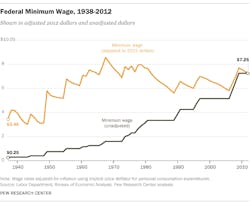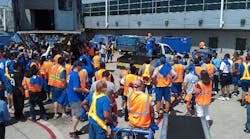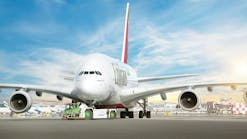A Thanksgiving For The 'Minimumly' Waged
We’ll no doubt hear more about raising the minimum wage in the weeks and months ahead. In SeaTac, WA, a hike in the minimum wage to $15 an hour, largely to go to ground crews and food and beverage employees of Sea-Tac Airport, seems to be the winner with a mere 77 vote advantage.
According to a report from UC Berkeley, airport and airport-related workers saw real hourly wages fall by an average of 15 percent from 2002 to 2012. The report also notes that, while the total number of workers in air transport-related industries has declined since 2001, the share of outsourced workers grew from 19 percent to 26 percent by 2011.
Meanwhile, Senate Democrats are looking to raise the federal minimum wage to as much as $10.10 an hour from the $7.25 an hour it's been since 2009. Earlier this month, Democratic senators and aides heard discussions led by outside economists explaining that wages have not kept pace with inflation since 1968, when the $1.60 federal minimum wage represented 54 percent of Americans’ average hourly earnings, according to the Congressional Research Service.
On top of much of this news, other communities around the country have also tried to establish so-called "living wages." Earlier this year, the District of Columbia tried to pass an ordinance requiring large, non-union retailers to pay their workers above the district’s $8.25-an-hour minimum wage. The bill had become part of a national campaign against the proliferation of low-wage jobs, and it also became entwined locally with Wal-Mart’s plans to open several stores in the district. The mayor eventually vetoed the measure and the council was unable to override the veto. Wal-Mart, which had threatened to abandon its plan if the bill became law, is proceeding with plans for at least five stores.
Plenty of other meg-retailers other than Wal-Mart lobbied against the measure. But Wal-Mart's a magnet for such controversy. Just last week, a picture from a Wal-Mart store in Ohio made the rounds on the web. "Please Donate Food Items Here, so Associates in Need Can Enjoy Thanksgiving Dinner" read a sign above some plastic tubs in an employee-only area of the store.
Of course, minimum wage workers aren't really entirely on their own, especially if they have children. There are programs like food stamps, Medicaid, and the earned income tax credit to help them along. But that's sort of the point. When profitable companies pay their workers unlivable wages, we end all up subsidizing their bottom lines.
However, even further up the pay scale, there's also plenty of labor unrest within the aviation industry. Just two weeks ago, Boeing machinists rejected a contract offer by a 2-1 margin. This week mechanics from United Airlines began staging protests at 12 airports and threatening a strike over pensions and health care costs. Even Southwest Airlines' ground crews, a source of marketing pride for the "Bags Fly Free" carrier, are protesting management's desire to outsource the work.
In the meantime, economists continue to debate the extent to which minimum-wage laws reduce poverty, income inequality and/or overall employment, and a 0.44 second Goggle search can produce any number of pros and cons of the issue voted on earlier this month specifically in SeaTac.
What do you think? Is it a Thanksgiving? Or is it a turkey?




